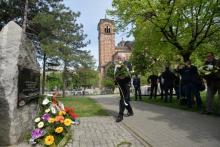Jasenovac concentration camp
Vučić: Humanity has no right to the third great war VIDEO / PHOTO
The central ceremony at the Monument to the Victims of Genocide in the complex of the former Nazi camp Staro Sajmite is led by President Aleksandar Vui.
As Croatia Remembers Holocaust, Govt Urged to Ban Ustasa Symbols
The Croatian parliament started its session with a minute of silence to commemorate International Holocaust Remembrance Day on Thursday, while a delegation led by Deputy Prime Minister Boris Milosevic and Culture Minister Nina Obuljen Korzinek laid wreaths at the Mirogoj Cemetery in the capital Zagreb.
Vučić after the meeting with Porfirije: "We reached an agreement" VIDEO / PHOTO
Historian Dejan Ristic also attended the meeting in the premises of the Patriarchate of the Serbian Orthodox Church.
Croatia’s Jasenovac Concentration Camp: The Victims Deserve the Truth
Several times a week, the Memorial Centre at Donja Gradina - the place where prisoners in the Ustasa-run Jasenovac-Stara Gradiska concentration camp complex in Croatia were brought every day to be liquidated - publishes posts on Twitter commemorating the lives of the camp's victims.
Jugović: Stamatović will also join SNS and become member of the SNS Presidency
"I think that Sapic is not the only leader of one party that will collectively join Serbian Progressive Party (SNS).
Operation "Flash" 26 years later: We were expelled only because of our Serbian origin
In 36 hours, 15.000 Serbs were expelled from Western Slavonia, which was part of the then Republika Srpska Krajina and under UN protection, while 283 Serbs were killed.
More than 16.000 members of the Croatian armed forces marched on Western Slavonia on May 1, with about 15.000 inhabitants and 4.000 soldiers.
‘Tragic Period in Croatian History’ Commemorated at Jasenovac Camp
Prime Minister Andrej Plenkovic told the annual commemoration at Jasenovac on Thursday that the Independent State of Croatia, NDH, a fascist puppet state run by the Ustasa movement and supported by Nazi Germany and Fascist Italy, was "one of the most tragic periods in Croatian history".
Controversial Serbian Holocaust Film Isn’t Anti-Croat Propaganda
Only a few recent Holocaust movies have provoked so many vituperative reviews or elicited so many strong opinions for reasons almost entirely divorced from the film itself.
Serbian Director Threatens US Lawsuit over WWII Film Review
Predrag 'Gaga' Antonijevic, director and producer of 'Dara of Jasenovac', Serbia's entry for the Best International Feature Film at the 2021 Oscars, which deals with crimes committed at the Jasenovac concentration camp in Croatia, said on Sunday that he intends to sue the Los Angeles Times for denying war crimes committed against Serbs at the WWII camp.
Vucic in Sremska Mitrovica Memorial Park: Genocide was committed against Serbs VIDEO
Sremska Mitrovica is one of the largest execution sites in World War II, the place where thousands of Serbs were killed, including the great painter Sava Sumanovic.
On the monument in Sremska Mitrovica, on three stone slabs, among other things, it is noted that 7.950 men and women have been killed by Germans and Ustashas since 1941 to 1944.










